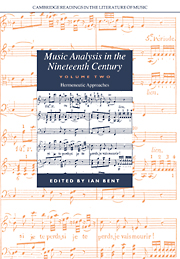Book contents
- Front matter
- Contents
- Preface to volumes I and II
- List of abbreviations
- General introduction
- Part I: Elucidatory analysis
- Introduction
- Analysis 1 Hector Berlioz (1803–1869)
- Analysis 2 Richard Wagner (1813–1883)
- Analysis 3 Wilhelm von Lenz (1809–1883)
- Analysis 4 Ernst von Elterlein [Ernst Gottschald] (1826-?)
- Analysis 5 Julius August Philipp Spitta (1841–1894)
- Analysis 6 Hans von Wolzogen (1848–1938)
- Analysis 7 Hermann Kretzschmar (1848–1924)
- Part II: Objective–subjective analysis: the hermeneutic circle
- Afterword to volumes I and II
- Bibliographical essay
- Index to Volumes I and II
Analysis 4 - Ernst von Elterlein [Ernst Gottschald] (1826-?)
Beethoven's Clavier-Sonaten für Freunde der Tonkunst erlätert (1856)
Published online by Cambridge University Press: 10 December 2009
- Front matter
- Contents
- Preface to volumes I and II
- List of abbreviations
- General introduction
- Part I: Elucidatory analysis
- Introduction
- Analysis 1 Hector Berlioz (1803–1869)
- Analysis 2 Richard Wagner (1813–1883)
- Analysis 3 Wilhelm von Lenz (1809–1883)
- Analysis 4 Ernst von Elterlein [Ernst Gottschald] (1826-?)
- Analysis 5 Julius August Philipp Spitta (1841–1894)
- Analysis 6 Hans von Wolzogen (1848–1938)
- Analysis 7 Hermann Kretzschmar (1848–1924)
- Part II: Objective–subjective analysis: the hermeneutic circle
- Afterword to volumes I and II
- Bibliographical essay
- Index to Volumes I and II
Summary
In 1857, the year after Robert Schumann's death, Franz Brendel, editor of the Neue Zeitschrift für Musik since 1845, announced a new initiative for the journal: to research the means of
grasping the nature of the creative impulse, not simply by subjective personal experience but by the objective shape of a composition, understanding the spiritual substance of a work from its external, technical configuration […], a path […] which in fact promises to reveal a new world to musicians.
In saying ‘I regard it as one of the next tasks of this journal to promote this advance’, he invoked as the starting point a series of abstracts that were currently appearing in the journal – abstracts of Friedrich Theodor Vischer's Aesthetics, or Science of the Beautiful of 1846–57, the music-aesthetic material of which had just appeared in the final volume.
This series of abstracts was written by one Ernst von Elterlein, apparently a legal official in Waldheim, Saxony with amateur musical interests, of whom virtually nothing is known, and whose name is said by Riemann to be a pseudonym for Ernst Gottschald. He produced, in all, seven such abstracts, in eleven instalments, giving himself the task of ‘presenting Vischer's aesthetics, which I have studied for years in isolation, to the musician in a series of letters’.
Von Elterlein also wrote two books of analyses of works by Beethoven. Since these were published in 1854 and 1856, it is right to see them against the background of this private study.
- Type
- Chapter
- Information
- Music Analysis in the Nineteenth Century , pp. 74 - 80Publisher: Cambridge University PressPrint publication year: 1994

